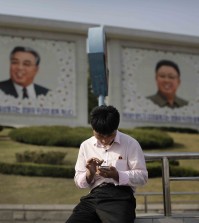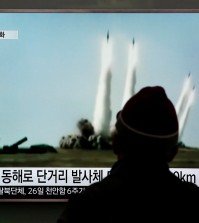- California Assembly OKs highest minimum wage in nation
- S. Korea unveils first graphic cigarette warnings
- US joins with South Korea, Japan in bid to deter North Korea
- LPGA golfer Chun In-gee finally back in action
- S. Korea won’t be top seed in final World Cup qualification round
- US men’s soccer misses 2nd straight Olympics
- US back on track in qualifying with 4-0 win over Guatemala
- High-intensity workout injuries spawn cottage industry
- CDC expands range of Zika mosquitoes into parts of Northeast
- Who knew? ‘The Walking Dead’ is helping families connect
American tourist detained in N. Korea
By Chung Min-uck
An elderly American man has been detained in North Korea since last month, according to reports in American media, but the reasons behind his detention have not been established.
Reports identified the man as 85-year-old Merrill Newman from Palo Alto in northern California, who entered North Korea on a tourist visa and was arrested by the North Korean authorities on Oct. 26 just before he was due to fly home.
Newman is known to have served as an infantry officer during the 1950-53 Korean War.
Reportedly, he traveled to the isolated country for reasons of personal interest, out of a desire to visit areas where he had formerly served during the war.
The U.S. government did not confirm the reports but said they were aware of them.
“We’ve seen the reports. I can’t provide you any specific details, given the Privacy Act,” said Jen Psaki, the spokeswoman for the U.S. State Department, said at a regular press briefing, Wednesday.
Experts say the reported detention is a rare case because the Pyongyang regime usually detains Korean-Americans in order to gain the upper hand in negotiations with Washington and Seoul.
“We haven’t heard anything” about the reasons for the October 26 detention of Merrill Newman, who usually lives in a California retirement home, his son Jeff Newman told CNN television. “We worked through the State Department from the day that he was supposed to depart… That started the diplomatic wheels turning, but we’ve heard nothing.”
He said his father is a Korean War veteran, and wanted to see the country and its culture in which he has been interested in for many years.
Kenneth Bae, a 45-year-old Korean-American man, has been held in North Korea for more than a year. He is in jail on charges of conducting hostile acts against the North Korean regime.
The U.S. State Department recently issued an updated travel warning on visiting North Korea.
It is the second issuance of an official travel warning in less than two months, as opposed to the usual practice of doing so every six months.












![일본 사도광산 [서경덕 교수 제공. 재판매 및 DB 금지]](http://www.koreatimesus.com/wp-content/uploads/2024/07/PYH2024072610800050400_P4-copy-120x134.jpg)


